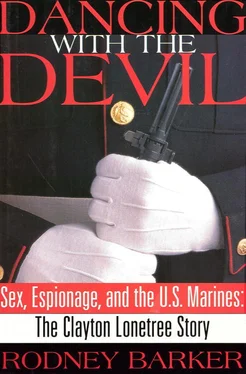Major Henderson thought this was a major miscalculation. Whether civilian counsel liked it or not, the eight Marine officers in the jury box were going to decide the fate of their client. These were mature, educated, professional military people who took their responsibilities seriously. When the time came for them to deliberate, their desire would be to see justice done. If they felt an accused was wrongly charged and an injustice was taking place, that would mean a lot more to them than caving to the desires of a higher authority, which was what civilian counsel seemed so concerned about. To think they would do less demeaned them and insulted the process. For the jury not to follow their consciences would harm the system they were sworn to uphold.
And so to counter the negative impression civilian counsel was making before the jury, Major Henderson had made a decision to begin sending private messages their way. Ethically he was walking a fine line. As an officer of the court there were rules he had to obey and conduct that had to be observed. But there was nothing in the books to prevent him from getting up and leaving the courtroom at key times, indicating he did not consider a particular area of inquiry to be important. Nothing to stop him from signaling through body language his restlessness with a nitpicking cross-examination on the part of civilian counsel. And when he pulled out a pocketknife and began whittling at his fingernails, it was done to let the members know this was Bill Kunstler’s show, and had little to do with him or their client.
What happened when final arguments were given had been the final straw for Major Henderson. At the start of the trial Mike Stuhff, in his role as lead counsel, had told Henderson that since he was the one most familiar with the military community, he would be giving the closing argument for the defense. Throughout the proceedings Stuhff had assured Major Henderson the closing was his, so Henderson had thought a lot about what he was going to say and how he was going to say it. Then, two days prior to closing, Mike Stuhff came up to him and said, “Dave, I’m sorry, but I’m going to let Bill do the closing.”
“You’re shitting me,” Henderson said. “I don’t believe it. He doesn’t have the foggiest idea how to sell this case to a military jury. He hasn’t even been here for the entire trial. How can you do this?”
Even as he asked the question, Henderson knew the answer. Throughout, Stuhff had deferred to William Kunstler. Whenever Henderson had voiced a different opinion, Stuhff had sided with Kunstler. Stuhff seemed to assume that if it was important, then Kunstler would pick up on it.
Mike Stuhff shrugged. “He wants to do it. I’ve got to let him.”
Henderson was livid. “What’s more important? Your relationship with Bill Kunstler or your client?”
Kunstler’s closing argument made Henderson cringe. At one point Kunstler deliberately brought in information that had been ruled inadmissible, so inflaming the judge that Roberts threatened to end the summation if Kunstler did it again.
In a military court-martial the jury also determined the sentence, and immediately after the guilty verdict was announced, Henderson cornered Mike Stuhff. “Okay, you guys have had your shot, and if you want my opinion, you’ve lost all credibility with the jury. I’m going to handle sentencing.”
Stuhff seemed distracted by the defeat and agreed to let Major Henderson take over.
Lonetree had been convicted on Friday, the sentencing hearing was set for Monday, and on Saturday morning Henderson had Sgt. Clayton Lonetree brought from the brig to his office in the basement of Lejeune Hall to prepare him to testify. At this point it was a given that Lonetree was going to jail; the question was for how long.
In an attempt to minimize the time the jury decided Lonetree’s crimes were worth, Henderson wanted to present his client as a remorseful figure. For several hours they ran through a gamut of questions—from the circumstances of his birth and the tragedy of growing up in a broken home, to his aspirations when he joined the Marine Corps, to his decision to come forward and confess. After they had spent several hours perfecting his answers, Henderson asked what he expected would be his final question. “Clayton, looking back at this now, after all these months, how do you feel?”
The obvious answer, the one he was expecting to hear, was, “I’m really sorry. I screwed up. I deserve to be punished for what I did.”
What Lonetree said was, “I really don’t think I did enough for the Russians.”
Henderson frowned. What the hell did that mean? He didn’t think he’d done enough to be punished severely? He wished he’d done more?
God only knew. But what that meant to Henderson was he couldn’t put his client on the stand. Who knew what would come out of his mouth? He was unpredictable, uncontrollable. He’d murder himself in front of a jury.
In the military there was an option of allowing an accused to make an unsworn statement that could not be subjected to cross-examination. By necessity the range of his testimony would be restricted, but Henderson felt the risks of putting Lonetree on the stand were too great. Major Beck would carve him up. What Henderson wanted to accomplish now was simply to personalize Lonetree for the jury. The prosecution had made him out to be the worst thing to happen to this country since Benedict Arnold, Henderson wanted the members to hear his voice, get a better sense of him as a human being, and, he hoped, bring them to the same understanding that he had of Sgt. Clayton Lonetree: that he as not an Indian militant bent on taking revenge on America; he was a confused young man whose ideological inclinations, if they could be called that, were the emotional outcome of his personality, and the government had mixed up personal disorientation with principled betrayal.
When the sentencing hearing was called to order the following Monday, Major Henderson put on two witnesses. The first person he called to the stand was Lt. Comdr. Forrest Sherman, the brig psychologist who had met informally with Lonetree for months. He asked Sherman if, based on their conversations, he had formed any opinions concerning the reasons why Sergeant Lonetree had gotten into trouble. In reply, the psychologist talked about Lonetree as someone who came from “a very conflicted background with no sense of foundation,” someone with a lot of unmet personal needs who couldn’t feel good about himself unless others thought well of him, a bright young man who was nonetheless sophomoric and lacking in common sense. In summation, he described Clayton Lonetree as a “wise fool.”
Major Henderson then told the court that he would be taking an unsworn statement from Sergeant Lonetree. This was the first time anyone outside the defense team or his family had heard from Sergeant Lonetree since his arrest, and his performance did little to satisfy those who were anxious to hear him talk about how and why he got involved with the Soviets. He spoke softly and haltingly. Much of what he said was mumbled and inaudible. Even the jury members strained to hear his words as he talked about his troubled childhood, his years in an orphanage, his overbearing father: “Every time I done anything, he criticized me. The only time he spoke to me, he was drunk.”
Only at the end of the testimony did Major Henderson touch on issues pertaining to his crimes.
Q. Sergeant Lonetree, before you became an MSG, Marine security guard, did you ever think of becoming a spy?
A. No, sir.
Q. How would you describe the way you felt about Communism at that time?
A. I was a devoted anti-Communist. The reasons why, because of the Marine Corps, I felt they were—as an elite status that we have—they just seemed to have a—actually that is one of the reasons why I didn’t like the Communists. I—Afghanistan, when it was invaded—just somewhat fanatical, anti-Red.
Читать дальше












